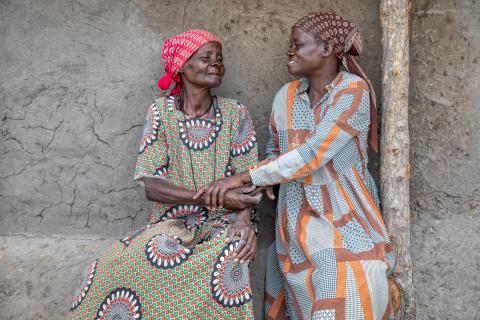“I go to sleep on an empty stomach”: Older people in humanitarian nutrition
This is a summary of the following report: “I go to sleep on an empty stomach” (2024) HelpAge International. https://www.helpage.org/resource/i-sleep-on-an-empty-stomach/
Older people are often overlooked in humanitarian responses, where the focus remains predominantly on infants, children, and maternal health. Due to factors such as disease susceptibility and changes in metabolism, older people are particularly vulnerable to malnutrition. This report consolidates a comprehensive review of 42 documents. Additional insight was then provided through interviews with 28 humanitarian actors and 10 older people from Ethiopia.
“Food remains the biggest challenge. It’s a constant reminder of how vulnerable we are in the face of circumstances beyond our control.” – Jirmo Toke, 81, Ethiopia
Although guidance on older people’s inclusion exists, it is rarely applied. A lack of consensus on diagnostic criteria for malnutrition in older age remains a barrier. Despite heterogeneity, current evidence suggests that 23% of older people experience malnutrition globally – with this figure heavily influenced by independent living status and care practices. There is a paucity of evidence on malnutrition, in terms of both prevalence and risk, for this group in humanitarian settings.
“We share not only the pain of hunger but also the worry about where the next meal will come from.” – Elema Boru, 75, Ethiopia
Older people have a variety of different needs, and treating them as a single group fails to account for the intersection of age, disability, ethnicity, sexual orientation, gender identity, economic activity, and health status. The evidence suggests that older women have poorer outcomes than men in disaster and conflict settings, with data from Ukraine highlighting that older women face greater barriers to accessing assistance than men. Lack of meaningful consultation with older people regarding their diverse needs during times of humanitarian crisis planning and response is particularly problematic. A compounding difficulty is the limited understanding of the diverse nutritional needs over the life course, particularly in later life, among humanitarian and nutrition partners.
“Life at this age is too difficult. No one helps me and my wife. I’m a pastoralist and I reared animals for a living. Those animals were my source of income, but due to the drought I lost all of my livestock.” – Male, 98, Qabana’a Kebele
Another barrier to including older people in humanitarian nutrition is a lack of funding. This is true of the nutrition sector in general, but organisations report particular challenges when obtaining funding for this age group in emergency settings. This may be partially attributed to negative perceptions surrounding older people in humanitarian crises, where they are often labelled as dependent or economically inactive. Reframing these perceptions remains critical. In crises, older people can provide support and wisdom to their communities. Many are actively involved in disaster response and recovery, family care, and income generation – with many having experienced previous crises themselves.
The full findings of the report are beyond the scope of this summary. We encourage readers to explore the 10 key recommendations found in the executive summary, with more detailed recommendations for nutrition cluster coordinators and members, national governments, and donors found in the body of the report. These point to the practical next steps to ensure the inclusion of older people in humanitarian nutrition responses.


